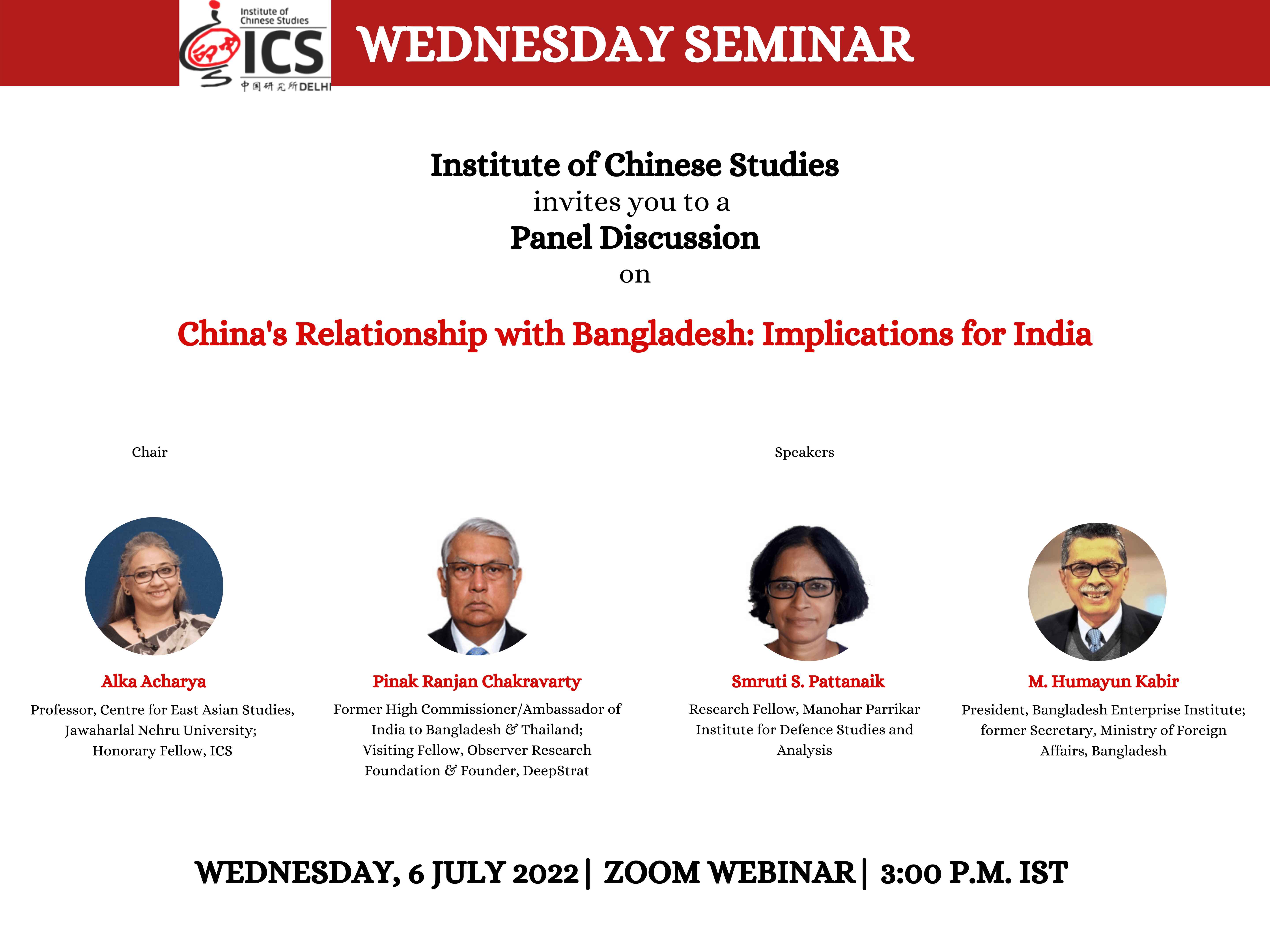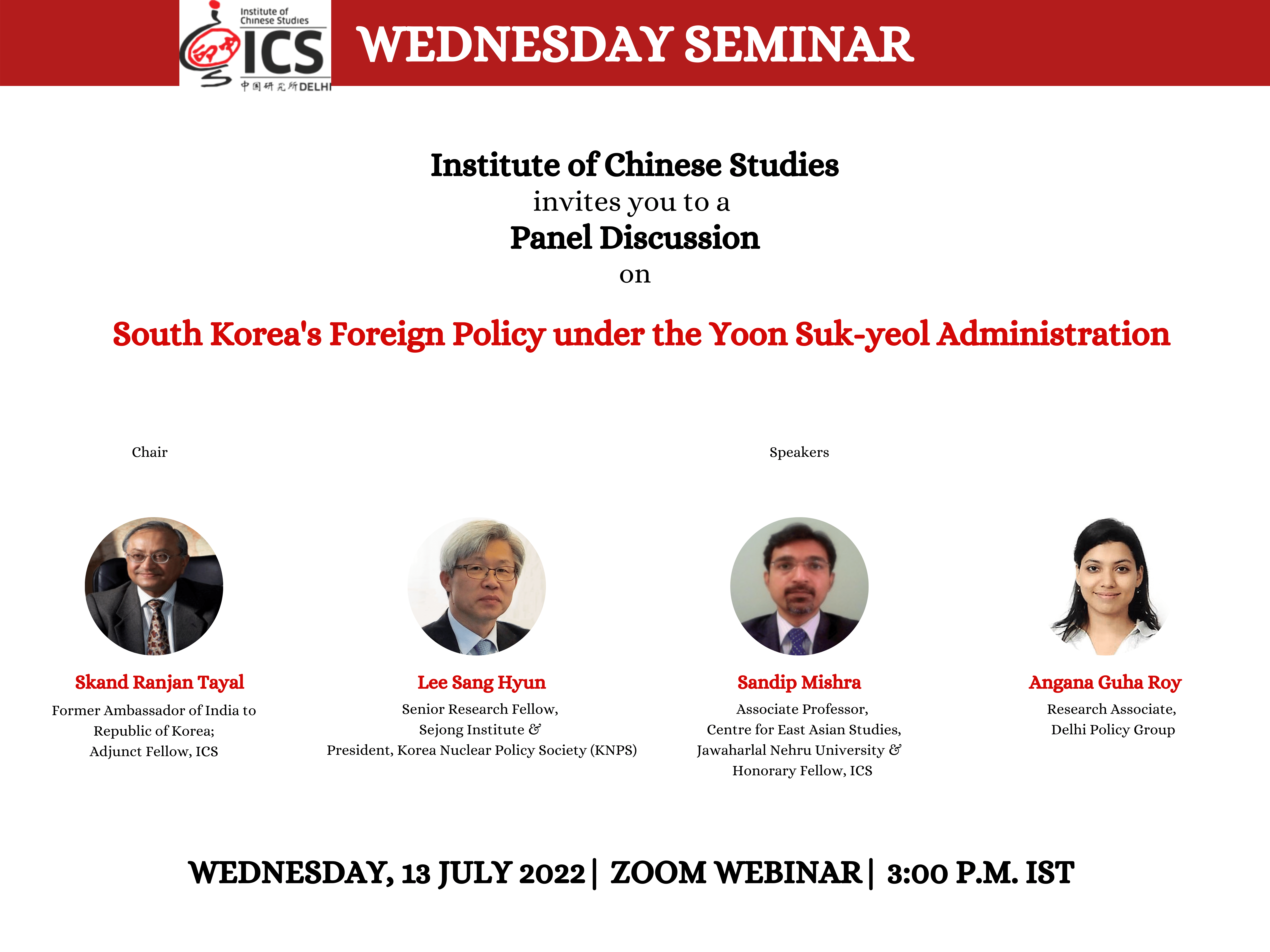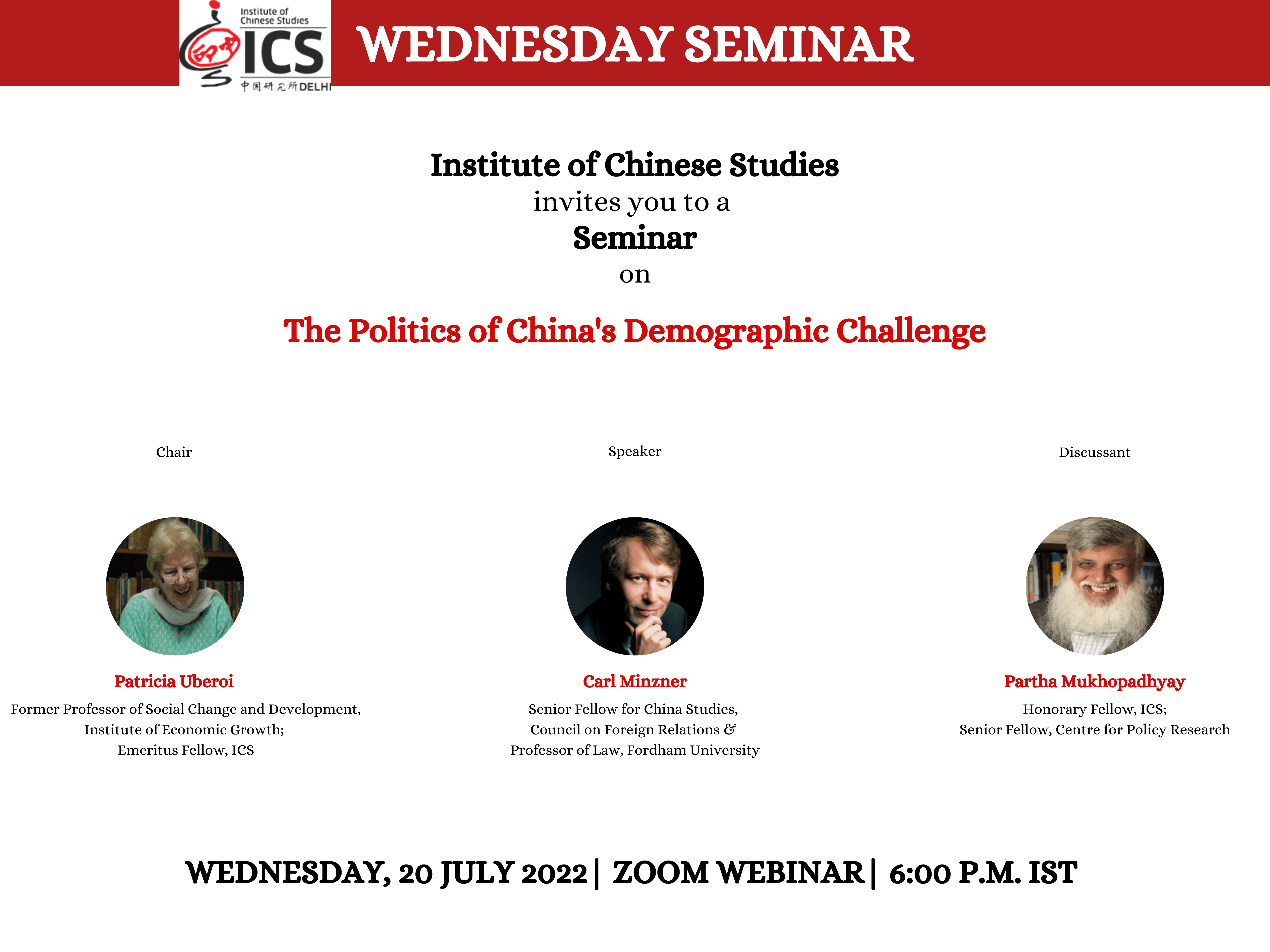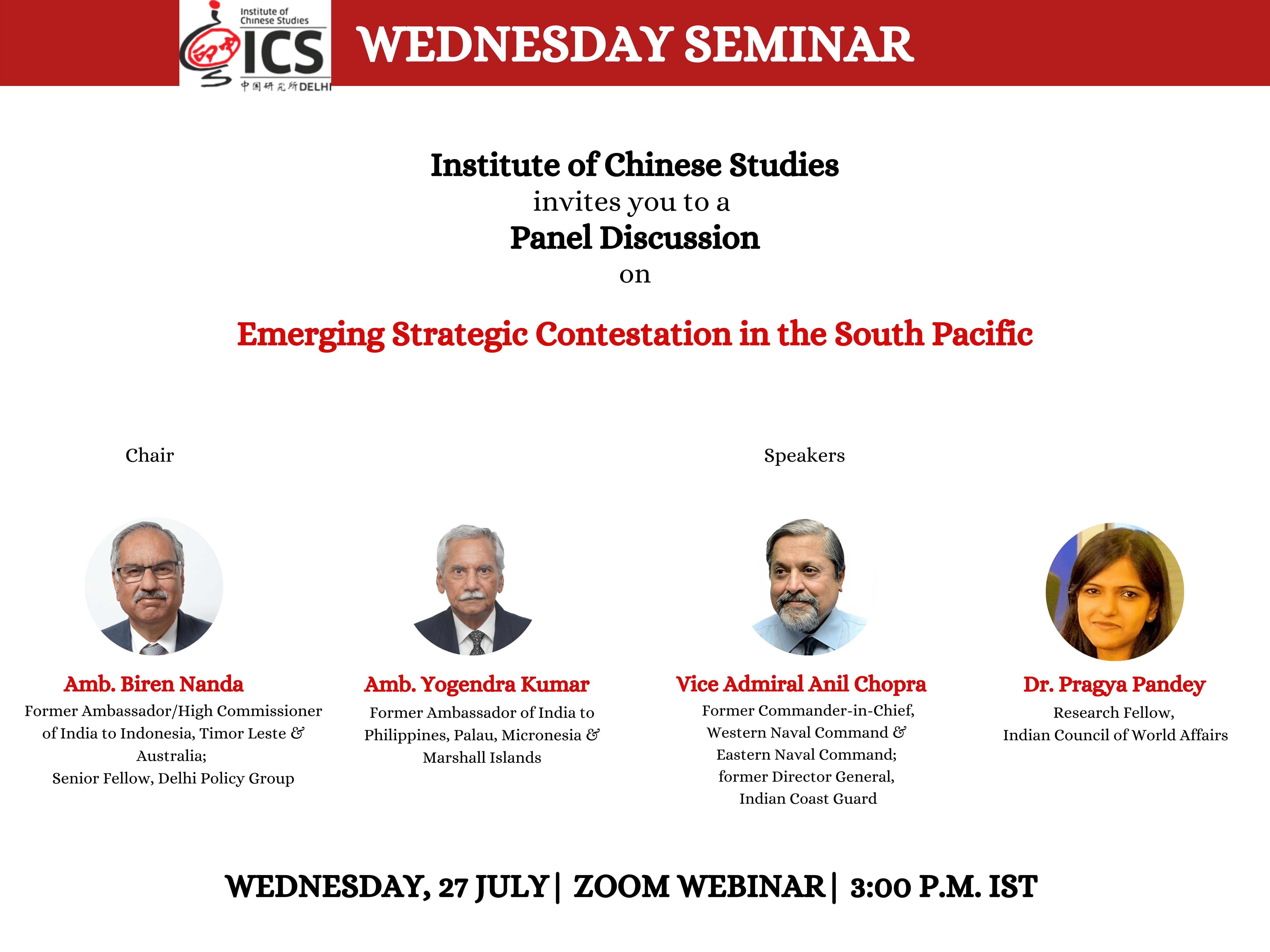 |
| |
| China’s Relationship with Bangladesh: Implications for India |
|
Amb. Pinak Ranjan Chakravarty, former High Commissioner/Ambassador of India to Bangladesh & Thailand; Dr. Smruti S. Pattanaik, Research Fellow, Manohar Parrikar Institute for Defence Studies and Analysis; Amb. M. Humayun Kabir, former Secretary, Ministry of Foreign Affairs, Bangladesh.
Wednesday Seminar | Zoom Webinar | 6 July 2022
|
| |
|
China's presence in South Asia has been a major challenge to India's neighbourhood policy as it has raised certain strategic concerns. China, with its vast economic resources has not only invested in the region but has also completed mega projects in time. However, in the recent past, some of the countries are facing economic distress as debt has mounted. Among the countries of South Asia, Bangladesh has successfully engaged both India and China and has benefitted from their investments in infrastructure, energy and trade. Unlike other countries, it has critically balanced its relations with both rather than playing one country against the other in a zero sum game. This reflects in the careful choosing of projects that have contributed to Bangladesh's growth trajectory and economic development. China, a country that had vetoed Bangladesh's entry to the UN as an independent state, is now its largest trading partner. This seminar focused on the evolving dynamics of Bangladesh's relations with China and examined its regional implications. This seminar was part of ICS’ China in South Asia Series.
|
| Watch> |
|
|
 |
| |
| South Korea’s Foreign Policy under the Yoon Suk-yeol Administration |
|
Dr. Sang Hyun Lee, Senior Research Fellow, Sejong Institute; Prof. Sandip Mishra, Associate Professor, Centre for East Asian Studies, Jawaharlal Nehru University; Dr. Angana Guha Roy, Research Associate, Delhi Policy Group.
Wednesday Seminar | Zoom Webinar | 13 July 2022
|
| |
|
In a closely contested presidential election in South Korea, Yoon Suk-yeol of the main opposition party got elected and took charge as the 13th President of South Korea on 10 May 2022. Prior to his sudden entry into politics, he was the Prosecutor General of South Korea and his experience in politics is quite limited. There are speculations about his leadership as well as his policies. He gave several bold and provocative statements during his election campaign but it would be interesting to see whether he moves ahead in accordance to his past utterances or moderates his postures. Apparently, he intends to bring a shift away from the previous administration’s foreign policy. He has promised to bring more warmth in the country’s relationship with the US and improve South Korea’s relationship with Japan. His statements that South Korea would invite more THAAD batteries as well as American tactical nuclear weapons in South Korea have annoyed China and it would be important to see if Yoon Suk-yeol’s approach causes economic and other repercussions for South Korea’s relations with China. The new President of South Korea would also look for more reciprocity in the inter-Korea relations and there are apprehensions that inter-Korea relations may remain stagnant during his tenure. Unlike the Moon Jae-in administration, the current administration appears to be more overt in its support to the Indo-Pacific strategy and not averse to becoming a member of the Quad. Moon Jae-in preferred to work through the New Southern Policy in the region but Yoon Suk-yeol preferences appear to be different. Thus, in the changing Indo-Pacific, the foreign policy orientation of the new administration of South Korea will be quite important. This seminar tried to decipher and understand Yoon Suk-yeol administration’s foreign policy approach and its implications for the region.
|
| Watch> |
|
|
 |
| |
| The Politics of China’s Demographic Challenge |
|
Prof. Carl Minzner, Senior Fellow, Council on Foreign Relations; Professor of Law, Fordham University.
Wednesday Seminar | Zoom Webinar |20 July 2022
|
| |
|
Along with the rest of East Asia, China faces a massive demographic challenge. The contours are well known. Once young, China is growing old. Fast. The working age population peaked in the early 2010s and will continually decline from here on out. China’s total population could start to decline as early as next year – following in the footsteps of Taiwan and South Korea. Official projections suggest the share of China’s population 65 years and older will triple between 2015 and 2050, when over 25% of the population will be over 65. But current birth statistics now suggest that China's aging process will actually be far more rapid than currently expected, with over a third of the population entering old age by mid-century. This will fuel increasing social pressures – including underfunded pensions, tight labour markets and eldercare for the rural population. How will Beijing respond? What lessons might be drawn from the experiences of China’s East Asian neighbours? And what will be the impact of this sweeping transition on Chinese politics and society, particularly under the current trajectory being charted by Xi Jinping. This seminar attempted to provide detailed answers to these complex questions.
|
| Watch> |
|
| |
 |
| |
| Emerging Strategic Contestation in the South Pacific |
|
Amb. Biren Nanda, former Ambassador/High Commissioner of India to Indonesia, Timor Leste & Australia; Amb. Yogendra Kumar, former Ambassador of India to Philippines, Palau, Micronesia & Marshall Islands; Vice Admiral Anil Chopra, former Commander-in-Chief, Western Naval Command & Eastern Naval Command; former Director General, Indian Coast Guard; Dr. Pragya Pandey, Research Fellow, Indian Council of World Affairs.
Wednesday Seminar | Zoom Webinar |27 July 2022
|
| |
|
In recent times, the South Pacific has emerged as a new arena for strategic contestation. Great powers like the U.S. and China are now jostling for influence in a region traditionally dominated by regional players like Australia and New Zealand. The region, which includes 14 sovereign nations, and seven territories, lies at the crossroads of strategically significant maritime trade routes. China has gradually increased its profile in the South Pacific, with nations such as the Solomon Islands and Kiribati changing their recognition from Taiwan to China in 2019, raising the tally to ten out of fourteen South Pacific countries now recognizing China. The recently concluded bilateral security arrangement between China and the Solomon Islands has raised concerns amongst the U.S. and its regional allies over the prospects of a Chinese military base in the Pacific. Chinese Foreign Minister Wang Yi and a large delegation also made an eight-country tour through the Pacific Islands, just after the Australian election and the Quad leaders' meeting. During the tour, China also floated the "China-Pacific Island Countries Common Development Vision" and "Five-Year Action Plan (2022–26)", which could potentially circumvent other regional initiatives such as that put forward by the United States, the Indo-Pacific Economic Framework for Prosperity. In response, the U.S., Australia and New Zealand have increased their diplomatic outreach to the Pacific Island Countries. The U.S. led 'Partners in the Blue Pacific' initiative launched in late June this year is one such attempt to counter China's inroads in the South Pacific. This seminar focused on the direction of this new strategic competition in the South Pacific and its implications for the stakeholders.
|
| Listen> |
|
|
|
|
|
 |
|
|
 |
| ICS ANALYSIS |
| |
West Asia and North Africa (WANA): China’s Enlarging Footprints Impact on the Indo-Pacific Region
|
| Rajiv Narayanan| Issue No. 149 | July 2022 |
| |
| The China Dream aims at re-establishing the Middle Kingdom in Asia, even as it expands its influence in other regions of Eurasia, Oceania, and the Americas. The Indo-Pacific Region (IPR) holds the key for such a domination. The continental construct of the IPR is as important as its maritime domain and needs equal attention. This includes the landlocked countries that are dependent on these oceans/seas for their trade. The West Asia and North African (WANA) regions form part of the western flank of the IPR and also provide a connect with rest of Africa, Asia, the Mediterranean Sea and Europe, i.e., Eurasia and Africa or Afro-Eurasia, which forms the ‘world island’ of Halford Mackinder. For China, gaining influence in this region would therefore be critical for the success of its Dream. |
| Read more >> |
|
|
 |
| ICS OCCASIONAL PAPERS |
| |
The Geopolitics of Japan’s Energy Transition: Case of the Middle East and Russia
|
| Parul Bakshi | Issue No: 92 | July 2022 |
| |
| With the recent release of the IPCC Working Group report of 2021 alerting code red for humanity, the prominence of the future climate ambitions of nations has risen exponentially. One of the most significant contributors to global carbon emissions, the energy sector, will play a prominent role in achieving a net-zero emission target to control global warming. In this context, Japan being one of the top five global carbon emitters is set to be a crucial player on the international green stage. While the economic and technological aspects of the Japanese energy transition are often discussed in detail, the role of geopolitics in this regard is often overlooked. |
| Read more >> |
|
|
 |
| ICS OCCASIONAL PAPERS |
| |
Geo-economic Motivations Behind Japan’s Security Conundrum in Taiwan
|
| Omkar Bhole| Issue No. 93 | July 2022 |
| |
| China’s growing military presence in Taiwan strait and East China sea has caused significant concerns in Tokyo in recent times. As a result, Taiwan’s defence and security has become one of the central themes of Japanese security policies as outlined by its recent defence white paper. ‘China threat' is the most crucial reason for Japan's interest in Taiwan's defence as emphasized by previous research related to Taiwan-Japan relations. However, existing research fails to define different aspects of ‘China threat’ envisaged by Tokyo. Considering geographical proximity between Japan and Taiwan, Chinese control over Taiwan is likely to complicate Sino-Japanese relations. |
| Read more >> |
|
|
| |
|
|
|





